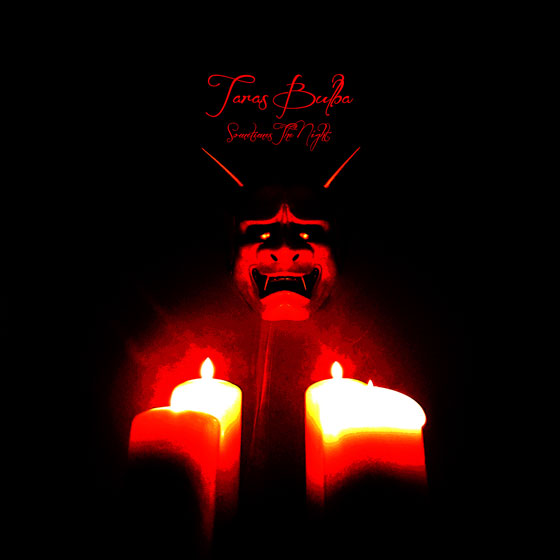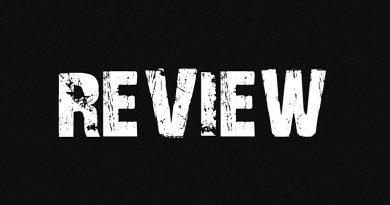Review: Taras Bulba ‘Sometimes The Night’
Presumably named after the film (as it has a celebrated soundtrack), Taras Bulba is a solo project from ex-Earthling Society front man Fred Laird that combines a range of musical influences including krautrock, 60s psych, world music, and film soundtracks. While it may sound like familiar territory for heads, Laird draws inspiration from film makers and authors, too, elements that come through in his music to create a sometimes-surreal mix. Sometimes The Night is the third Taras Bulba release and is especially indebted to film and film scores, in particular the work of David Lynch, Jean Cocteau, and Kung Fu horror – because why not?

Recorded at his home studio between 2020 and 2021, the album has the raw improvisational quality you would expect but with a film score mentality. The list of musical influences for the album include early Bad Seeds, Crime and the City Solution, Gallon Drunk, Bohren and Der Club of Gore, The Cramps, Link Wray, Hasil Adkins, and ‘that spooky organ sound that dominates the midnight movie classic Carnival Of Souls.’ So there’s a lot to digest, but while it may seem like a tall order to combine all of these elements coherently, each track is akin to a scene from a film, but you don’t need to be familiar with anything Laird draws from to just listen and let the music direct what you see.
First track The Green Eyes Of Dragon rumbles with what sounds like Bad Seed Mick Harvey’s dirty bass tone, assisted by psych-surf guitar and keys that sound like Nick Cave channeling Anton LaVey’s 60s chintz. It’s dark and carnivalesque, possibly bordering on the absurd, but hypnotic with an edge that’s intriguing and mysterious. It calls to mind David Lynch’s world, dark, creepy, but wryly humorous and self-aware.
From Lynch to one of his major influences, the following track Orphee is dedicated to French avant-garde poet and dream cinema filmmaker Jean Cocteau. It’s an appropriately surreal dream pop jam, like a sprawling freeform Cocteau Twins, all shimmering guitar delay with guest vocalist Daisy Atkinson sounding something between Liz Fraser and My Bloody Valentine’s Bilinda Butcher.
From the Grave brings a doomy organ-led swing as bass clangs away in the background and Link Wray-style guitar mutes and chugs next door. It sounds impressively like a full band improvising a theme of Tocatta and Fugue portent, everything ebbing and flowing and going and going. A little ragged perhaps, but it does a better job of conjuring obscure 60s and 70s horror than most derivative retro doom bands.
Night Train To Drug Town conjures a modern western noir vibe. Heavy rain, clip clopping percussion, the sneer of vibrato guitar chords drenched in eerie reverb, more spooky organ swells, and cold winds howling into the night. Following is One More Lonely Angel, a spot of reflective noir jazz with mournful piano, guitar striations and a subtle wash that’s desolate but soft. A little more conventional, but still with that familiar repetitive and improvisational feel.
hypnotic, dirgy, swinging soundtrack of dark atmospheres and moody tones with elements of dream pop…
If this is all sounding like Taras Bulba is a bit of a everything-but-the-kitchen-sink project with a lack of clarity, all bloated sprawls and self-indulgent experimentation – don’t be put off. Total mayhem is avoided by way of a deftness to the composition which means things sway but they don’t drift. Or at least they don’t drift for too long. The psychedelic lens and krautrock mentality means each track on side A feels like an atmospheric jam, but all the various influences and elements are assimilated, and the approach is understated. Overall, the result is immersive rather than overwhelming.
Side B is more of a mixed bag. It begins with the sparse and somewhat despondent title track Sometimes The Night, with Daisy Atkinson providing more vocal. Just when things seem unremarkable, forlorn harmonica plays the track out among a low swell of sound.
The Sound Of Waves calls to mind a jaunty version of the film score for Werner Herzog’s Aguirre, with Popul Vuh flutes, synths, a tribal beat, and distant saxophone. Ending with sounds of the sea on the shore, this comes off like a kind of world muzak that’s too great a shift in mood to not feel out of place for me. Thankfully, things return to the swing and sneer of scotch-soaked noir and cigar smoke guitars with The Big Duvall, complete with tendrils of lead and deranged organ tones languishing among woozy slides and submerged cool. Guest saxophone comes from Mike Blatchford, recorded on a mobile phone and later added to the mix. That would be an impressive fact, even if it didn’t work, but it’s engaging as it is layered.
Final track House In The Snow melds a precision drumbeat, spacey synth, and somber descending piano before a halting ambience introduces more fluid and soulful saxophone which accompanies a baritone guitar in drawing things to a downbeat close.
Like the imaginary movie cut-up that the music evokes no doubt would, Sometimes The Night will either grip you like a Lynchian drug-induced fever dream (I mean that as a good thing) or pass you by as a little too busy and meandering. If I was a director, I might cut certain scenes down, or out completely, but this hypnotic, dirgy, swinging soundtrack of dark atmospheres and moody tones with elements of dream pop deserves at least one proper listen through before you decide, even just for its ambitious scope and creative approach.
Good luck finding this concoction of influences anywhere else, and if you do, I doubt it will be better than this. An immersive trip of visual sounds – and not just for heads.
Label: Riot Season
Band Links: Facebook | Bandcamp | Instagram
Scribed by: Josuph Price

